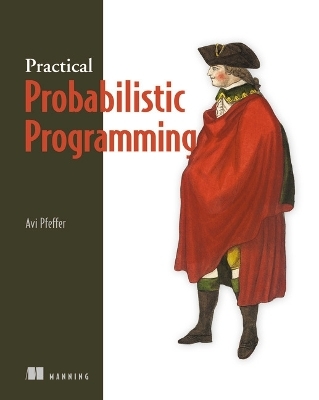
Practical Probabilistic Programming
Seiten
2016
Manning Publications (Verlag)
978-1-61729-233-0 (ISBN)
Manning Publications (Verlag)
978-1-61729-233-0 (ISBN)
- Titel nicht im Sortiment
- Artikel merken
DESCRIPTION
Data accumulated about customers, products, and website users can not only help interpret the past, it can help predict the future! Probabilistic programming is a programming paradigm in which code models are used to draw probabilistic inferences from data. By applying specialized algorithms, programs assign degrees of probability to conclusions and make it possible to forecast future events like sales trends, computer system failures, experimental outcomes, and other critical concerns.
Practical Probabilistic Programming explains how to use the PP paradigm to model application domains and express those probabilistic models in code. It shows how to use the Figaro language to build a spam filter and apply Bayesian and Markov networks to diagnose computer system data problems and recover digital images. Then it dives into the world of probabilistic inference, where algorithms help turn the extended prediction of social media usage into a science. The book covers functional-style programming for text analysis and using object-oriented models to predict social phenomena like the spread of tweets, and using open universe models to model real-life social media usage. It also teaches the principles of algorithms such as belief propagation and Markov chain Monte Carlo. The book closes out with modeling dynamic systems by using a product cycle as its main example and explains how probabilistic
KEY SELLING POINTS
Covers the basic rules of probabilistic inference
Illustrated with useful practical examples
Build a wide variety of probabilistic models
AUDIENCE
Code examples are written in Figaro. Some knowledge of Scala and a basic foundation in data science is helpful. No prior exposure to probabilistic programming is required.
ABOUT THE TECHNOLOGY
Probabilistic programming is a new discipline, and the tools and best practices are still emerging. Powerful new tools like the Figaro library built into Scala make probabilistic programming more practical in day-to-day work as a data scientist.
Data accumulated about customers, products, and website users can not only help interpret the past, it can help predict the future! Probabilistic programming is a programming paradigm in which code models are used to draw probabilistic inferences from data. By applying specialized algorithms, programs assign degrees of probability to conclusions and make it possible to forecast future events like sales trends, computer system failures, experimental outcomes, and other critical concerns.
Practical Probabilistic Programming explains how to use the PP paradigm to model application domains and express those probabilistic models in code. It shows how to use the Figaro language to build a spam filter and apply Bayesian and Markov networks to diagnose computer system data problems and recover digital images. Then it dives into the world of probabilistic inference, where algorithms help turn the extended prediction of social media usage into a science. The book covers functional-style programming for text analysis and using object-oriented models to predict social phenomena like the spread of tweets, and using open universe models to model real-life social media usage. It also teaches the principles of algorithms such as belief propagation and Markov chain Monte Carlo. The book closes out with modeling dynamic systems by using a product cycle as its main example and explains how probabilistic
KEY SELLING POINTS
Covers the basic rules of probabilistic inference
Illustrated with useful practical examples
Build a wide variety of probabilistic models
AUDIENCE
Code examples are written in Figaro. Some knowledge of Scala and a basic foundation in data science is helpful. No prior exposure to probabilistic programming is required.
ABOUT THE TECHNOLOGY
Probabilistic programming is a new discipline, and the tools and best practices are still emerging. Powerful new tools like the Figaro library built into Scala make probabilistic programming more practical in day-to-day work as a data scientist.
Avi Pfeffer is the principal developer of the Figaro language for probabilistic programming. He graduated from Stanford, taught at Harvard, and is currently a principal scientist at Charles River Analytics.
| Erscheint lt. Verlag | 10.4.2016 |
|---|---|
| Verlagsort | New York |
| Sprache | englisch |
| Maße | 184 x 235 mm |
| Gewicht | 734 g |
| Themenwelt | Informatik ► Datenbanken ► Data Warehouse / Data Mining |
| Mathematik / Informatik ► Informatik ► Grafik / Design | |
| Informatik ► Software Entwicklung ► Objektorientierung | |
| Informatik ► Theorie / Studium ► Algorithmen | |
| Mathematik / Informatik ► Informatik ► Web / Internet | |
| ISBN-10 | 1-61729-233-8 / 1617292338 |
| ISBN-13 | 978-1-61729-233-0 / 9781617292330 |
| Zustand | Neuware |
| Haben Sie eine Frage zum Produkt? |
Mehr entdecken
aus dem Bereich
aus dem Bereich
Datenanalyse für Künstliche Intelligenz
Buch | Softcover (2024)
De Gruyter Oldenbourg (Verlag)
74,95 €
Auswertung von Daten mit pandas, NumPy und IPython
Buch | Softcover (2023)
O'Reilly (Verlag)
44,90 €


